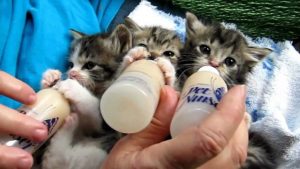 Each spring animal shelters receive many kittens too young to survive more than an hour or two without a mother. These kittens are called “neonates.” Sadly, most of the neonate kittens that shelters takes in are orphans. People find these babies in their garage, barn, flowerbeds and many other places where the mother felt safe from predators and intruders while she gave birth.
Each spring animal shelters receive many kittens too young to survive more than an hour or two without a mother. These kittens are called “neonates.” Sadly, most of the neonate kittens that shelters takes in are orphans. People find these babies in their garage, barn, flowerbeds and many other places where the mother felt safe from predators and intruders while she gave birth.
Understandably, some people feel they are helping neonate kittens when they bring them to a shelter. Actually, they are putting these little lives at tremendous risk because euthanasia may be the only way a shelter can save them from suffering an agonizing death by starvation.
To avoid such a horrible fate, leave neonate kittens where you find them; they are not abandoned – and momma cat is their best guarantee of survival.
A momma cat, called a queen, will sometimes leave her offspring to find food or water for herself. She will return to care for them – but when her kittens are taken away from her, they have no chance to survive without significant human intervention.
Healthy weaned kittens are quickly adopted. So anything we can do to help neonates reach full “kitten-hood” (8 weeks) improves their chance of eventually finding a loving home. The best way to help neonate kittens is to leave them with mom until they are old enough to survive on their own before bringing them to a shelter.
Despite this advice, many neonate kittens still find their way to animal shelters every year. So, each year animal shelters prepare for this influx by recruiting volunteers willing to help these innocents survive by joining what I call, the Baby Bottle Brigade. Ideally, local shelters train their Baby Bottle Brigade volunteers to foster these babies at home until they are old enough to be spayed or neutered and placed for adoption.
The Merriam-Webster Dictionary defines “foster” as providing parental care and nurture to children not related through legal or blood ties. State Law defines “adoptable animals” as animals 8 weeks of age or older; which means these little orphans have no legal standing. In fact, most shelters don’t even count neonates in their euthanasia statistics. At shelters I am associated with, we report the outcome of every animal, because we believe every animal counts. Most animal shelters do their best to provide loving care and nurture even to these lost souls with whom we have no legal or blood ties.
The problem is that animal shelters can’t save them all by themselves. They need our help. Depending on the age of the neonates, they may require four to eight weeks of intense foster care. Though many dedicated shelter employees help foster neonates above and beyond their daily job duties, many kittens will not survive without your help. If you are willing and able to help save these lives, most animal shelters will provide the training, support and supplies you need to be a successful foster parent.
This is a big commitment and a true test of our compassion. Even with our best efforts, not all foster babies will survive. But they can all be loved. These babies need to be bottle fed every two hours around the clock for several weeks – making this the perfect family, club, or faith-based organizational project. Fostering helpless neonates is an ideal way to foster compassion and respect for the true value and sanctity of all life in our community.
Have you saved a life today? Join the Baby Bottle Brigade in your community and experience the satisfaction that comes from being a foster parent and saving a life.
Source: What to do when you find newborn kittens in your yard
